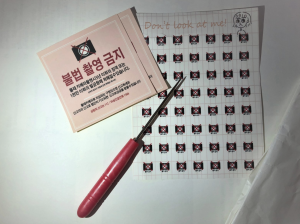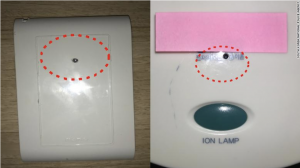Spycams in South Korea
Spycams are miniature sized cameras that are secretly installed to take nonconsensual pictures and videos. These pictures and videos are sent, shared with, and sold to others through private and public social media platforms. In South Korea, women are specifically being targeted and has sparked the recent feminist movements in the past few years. Women are forced to be cautious when out in the public and in private rooms, as these small cameras are being hidden in public bathrooms, private motels, schools, and many more places. There are ethical concerns of invasion of privacy in sharing this unconsented content. Further punishment measures are taken when this “spycam porn” is shared with other sources. Especially since the creation and distribution of porn is illegal in South Korea. Women are bringing attention to this matter and the government is putting extra efforts into tracking these spycams.
Contents
Reactions
Fear

In a recent case that was brought up in March 2019, about 1,600 people were secretly filmed in motels in South Korea.[2] This was also live-streamed to the online world for people that paid to watch. Cameras were hidden in digital TV boxes, wall sockets, and hairdryer holders.[3] These cameras are so small and are very hard to find. Because it is very difficult to detect if there are spycams or you are being filmed, there has been this fear that has surfaced. Women are afraid to even use public bathrooms, or really anything outside of their homes.[4] In a survey, it was reported that more than two out of three Seoul citizens were in fear of being filmed by secretly hidden cameras in public.[5] For women, they are most scared to use public restrooms, which leads to them checking for hidden cameras in their stalls or just not using public restrooms. [6]
Feminist movement

70,000 women protested on the streets in South Korea with signs that said “My life is not your porn” on August 4, 2018.[8] With this protest, they were addressing the seriousness of these hidden cameras and gender violence against women.[9] The feminist movement also includes women starting their own activism with actions of their own. Chung Soo-young started making emergency kits after she saw a man rushing out of women's restroom at a coffee shop in Seoul.[10] She immediately checked for any hidden cameras and became constantly worried about the fact that she can be secretly filmed at any moment.[11] The emergency kits include a small icepick to break tiny camera lenses, silicone sealant to fill holes, and a large sheet of square stickers to cover up holes as well.[12] More than 600 people bought kits and Chung also started to build an archive of the illegally filmed videos and pictures to show how serious this problem is.[13] In the past few years, this has become more about just having voyeuristic images and videos being shared without consent. There has been a call for gender equality in Korea, which has been seen as the major reason for why women cannot speak up about sexual abuse.[14] The protest on August 4th demanded action from the government to address these gender biases and allow women to feel safe.
Solutions
Government action
With the massive attention that the protests brought with 70,000 people gathering for immediate action from the government, the government responded by taking this matter more seriously.[15] The Korea Communications Standards Commission (KCSC) created a 16-member digital sex crime monitoring unit which operates 24 hours a day.[16] The mission of this force is to hunt down and remove sexual videos that have been posted without consent.[17] Their goal is to contain the spread of content in the first 24 hours as information travels quickly online.[18]. There was a case where a victim sent them 100 different sites where a sex video was secretly shot by her ex-boyfriend and uploaded.[19] This type of case and the task to completely remove this video was described as "nearly impossible".[20] With videos being shared so quickly, it is hard to track them and take them down entirely from the digital world. During the summer time, hidden cameras became more of an issue as it digital peeping Toms were installing cameras at beaches and swimming pools to film women while they were undressing.[21] To address these actions, the police formed teams that would go searching for these hidden cameras.[22] With infrared cameras and electrical detectors, the police constantly searched through bathrooms and locker rooms for them.[23] As technology continues to improve, hidden cameras have gone from physicals to streaming from smartphones. At swimming pools, the police tried to tackle this issue by distributing stickers to cover the cameras on people's smartphones.[24]
Ethical Complications
With the number of hidden camera cases increasing every year, it has become harder to track illegal content and prevent this unconsented material from being shared with the public. There are ethical concerns with these small cameras as privacy is being taken away from individuals. The idea that these cameras are hidden and out of sight is the first concern that comes up. There is no awareness of the person that is being recorded as individuals cannot see the act of being filmed. The next concern involves not giving permission to take pictures or videos. Aside from the voyeuristic material that these hidden cameras are capturing, they were never even given the permission to take these photos and videos. The last concern is that after these images and recordings are taken, they are being shared and sold without again the permission of the person that was filmed. Hidden cameras are constantly being used to invade the privacy of individuals and stripping their ability to control their information online. Since this illegal content is shared through websites, anyone can access this information with the click of a button and see images and videos of people that were never given consent. For victims, this information can be online without them every knowing about it.
References
- ↑ Our Foreign Staff, "South Korea spycam protests swell as women object to illegal secretive porm", The Telegraph, 08-04-2018. Retrieved 03-26-2020.
- ↑ Sophie Jeong & James Griffiths, "Hundreds of motel guests were secretly filmed and live-streamed online" "CNN", 03-21-2019. Retrieved 03-26-2020.
- ↑ Sophie Jeong & James Griffiths, "Hundreds of motel guests were secretly filmed and live-streamed online" "CNN", 03-21-2019. Retrieved 03-26-2020.
- ↑ Sophie Jeong & James Griffiths, "Hundreds of motel guests were secretly filmed and live-streamed online" "CNN", 03-21-2019. Retrieved 03-26-2020.
- ↑ Eun-ji Bahk, "69% of Seoulites living in fear of spycams", The Korea Times, 06-18-2019. Retrieved 03-26-2020.
- ↑ Eun-ji Bahk, "69% of Seoulites living in fear of spycams", The Korea Times, 06-18-2019. Retrieved 03-26-2020.
- ↑ Se Eun Gong & Michael Sullivan, "South Korean Women Fight Back Against Spy Cams in Pubic Bathrooms", npr, 10-19-2018. Retrieved 03-26-2020.
- ↑ Se Eun Gong & Michael Sullivan, "South Korean Women Fight Back Against Spy Cams in Pubic Bathrooms", npr, 10-19-2018. Retrieved 03-26-2020.
- ↑ Se Eun Gong & Michael Sullivan, "South Korean Women Fight Back Against Spy Cams in Pubic Bathrooms", npr, 10-19-2018. Retrieved 03-26-2020.
- ↑ Se Eun Gong & Michael Sullivan, "South Korean Women Fight Back Against Spy Cams in Pubic Bathrooms", npr, 10-19-2018. Retrieved 03-26-2020.
- ↑ Se Eun Gong & Michael Sullivan, "South Korean Women Fight Back Against Spy Cams in Pubic Bathrooms", npr, 10-19-2018. Retrieved 03-26-2020.
- ↑ Se Eun Gong & Michael Sullivan, "South Korean Women Fight Back Against Spy Cams in Pubic Bathrooms", npr, 10-19-2018. Retrieved 03-26-2020.
- ↑ Se Eun Gong & Michael Sullivan, "South Korean Women Fight Back Against Spy Cams in Pubic Bathrooms", npr, 10-19-2018. Retrieved 03-26-2020.
- ↑ Se Eun Gong & Michael Sullivan, "South Korean Women Fight Back Against Spy Cams in Pubic Bathrooms", npr, 10-19-2018. Retrieved 03-26-2020.
- ↑ Se Eun Gong & Michael Sullivan, "South Korean Women Fight Back Against Spy Cams in Pubic Bathrooms", npr, 10-19-2018. Retrieved 03-26-2020.
- ↑ Agence France-Presse, "South Korea battles 'spycam port' with 24/7 monitoring by 16-member unit", South China Morning Post, 11-29-2019. Retrieved 03-26-2020.
- ↑ Agence France-Presse, "South Korea battles 'spycam port' with 24/7 monitoring by 16-member unit", South China Morning Post, 11-29-2019. Retrieved 03-26-2020.
- ↑ Agence France-Presse, "South Korea battles 'spycam port' with 24/7 monitoring by 16-member unit", South China Morning Post, 11-29-2019. Retrieved 03-26-2020.
- ↑ Agence France-Presse, "South Korea battles 'spycam port' with 24/7 monitoring by 16-member unit", South China Morning Post, 11-29-2019. Retrieved 03-26-2020.
- ↑ Agence France-Presse, "South Korea battles 'spycam port' with 24/7 monitoring by 16-member unit", South China Morning Post, 11-29-2019. Retrieved 03-26-2020.
- ↑ Adam Taylor & Min Joo Kim, "At South Korean beaches and swimming pools, a war against tiny spy cameras", The Washington Post, 07-30-2018. Retrieved 03-26-2020.
- ↑ Adam Taylor & Min Joo Kim, "At South Korean beaches and swimming pools, a war against tiny spy cameras", The Washington Post, 07-30-2018. Retrieved 03-26-2020.
- ↑ Adam Taylor & Min Joo Kim, "At South Korean beaches and swimming pools, a war against tiny spy cameras", The Washington Post, 07-30-2018. Retrieved 03-26-2020.
- ↑ Adam Taylor & Min Joo Kim, "At South Korean beaches and swimming pools, a war against tiny spy cameras", The Washington Post, 07-30-2018. Retrieved 03-26-2020.
